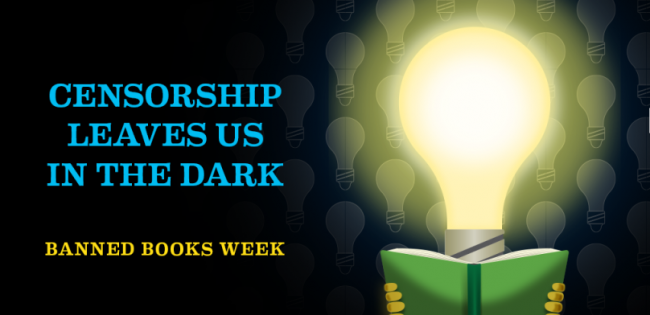
Earlier this month in Nashville, Tennessee, The Boy Who Lived became The Boy They Banned. According to a Washington Post article, a pastor at St. Edward Catholic School expelled the Harry Potter series on the counsel of several exorcists.
It’s not the first time J.K. Rowling’s beloved boy wizard was kicked out of school. Although it’s been a while since it last raised hackles, the Harry Potter series sits atop an American Library Association (ALA) list of most banned/challenged books that covers the years 2000 to 2009.
Harry’s recent expulsion serves as a timely prelude to the start of Banned Books Week 2019, beginning September 22. This year’s theme is “Censorship Leaves Us in the Dark. Keep the Light On!”
The University of Rochester’s River Campus Libraries has always been a source of enlightenment. That’s because it has always made books—and other materials—available that hold a broad range of views. For example, the Department of Rare Books, Special Collections, and Preservation holds a first-edition copy of Salman Rushdie’s much-contested The Satanic Verses, banned in 11 countries because of its criticism of Islam. And Rush Rhees Library has two books available that made the ALA’s 2018 list of Top Ten Most Challenged Books:
Challenged for: deemed “anti-cop,” drug use, profanity, and sexual references
Challenged for: gambling, profanity, religious viewpoint, sexual references, violence, and underage drinking
We asked a few members of the University community to shine a light on censorship by sharing their thoughts on a banned/challenged book in our collection, as well as book-banning.
Carol St. George
Associate Professor, Teaching and Curriculum
Director, Reading and Literacies Program
Harry Potter and the Sorcerer’s Stone, J.K. Rowling
There was a time I was reading this to a class. I had a Catholic parent ask me to have her child removed. I had a really good relationship with her, so I asked her, ‘Have you read it?’ She said, ‘No.’ I told her to take it and read it. And when she was done, she said, ‘You’re right. It’s a charming story.’
I knew it was because I read it. My father read it. My son read it. Then the movie came out, and we all when to see it together. This one book brought three generations together. That’s pretty powerful stuff.
Did you see it’s been removed from that Catholic school in Tennessee? Those kids are now deprived of an experience that could give them so much joy—all because a group of people thinks their position is the right position. That’s what bothers me most. I’ve seen people’s opinions change after reading a book. I’ve experienced it myself.
When children’s books are banned, it’s taking ideas out of their grasp. It eliminates the opportunity for them to challenge their thinking and become a fuller person.
—CSG
Jessica Lacher-Feldman
Assistant Dean
Joseph N. Lambert and Harold B. Schleifer Director of Rare Books, Special Collections and Preservation
To Kill a Mockingbird, Harper Lee
In the early 2000s, I had the privilege of being a point person for Ms. Lee for several years when she visited her alma mater, the University of Alabama, in conjunction with a high school essay contest. Each year, in addition to working with her while she signed books, I also had the honor of curating an exhibit based on her work and her time at the University.
Ms. Lee created the fictional world of Maycomb, but it is based on the very real town of Monroeville, Alabama, and the experiences she had there. Though a different time and place, and experiences far removed from my own reality, this important, brilliant, and beautiful novel gave me understanding and perspective that has helped to shape my own world.
Books are meant to show us things that we might not have otherwise experienced. The violence or racist language a book uses and the fear and disgust it invokes are critical to our understanding of our own world and how we can work to make it better. Rather than banning books like To Kill a Mockingbird we should all read them, and we should teach both the book and the historical context.
—JLF
Chad Post
Publisher, Open Letter Books
Slaughterhouse-Five, Kurt Vonnegut
I loved all the Kurt Vonnegut books because they were intellectually stimulating and unique compared to other books I was reading in school. I first read it in high school, and it had this whole new voice. The different clicks of ‘so it goes’ and the conversational tone were really interesting. It opened me up to thinking about things differently. So, from then, until like the middle of college, I probably read 15 of his novels, one after another.
Apparently, in 1972, Slaughterhouse-Five was banned in Oakland County, Michigan, which is not that far from where I grew up because it's ‘depraved, immoral, psychotic, vulgar, and anti-Christian.’ They burned 32 copies of it. Today, this kind of thing feels like an archaic practice that we shouldn't have to deal with anymore.
The books that get banned always seem to be things that kids are being exposed to. I think that's silly and counterproductive. Saying ‘I don't want you to read this book’ is only going to make kids want to read it more. So, the whole book banning thing is fundamentally backward.
—CP
(Side note: Edward R. Crone, Jr. (1923–1945) was the inspiration for the Billy Pilgrim, the main character in Slaughterhouse-Five. Crone was born in Rochester and was buried in Mount Hope Cemetery with full military honors.) ∎
If you're interested in putting more books, of any kind, into the hands of children, consider supporting Project READ, a literacy program for at-risk students. To learn more, contact Carol St. George. Enjoy reading about the University of Rochester Libraries? Subscribe to Tower Talk.

